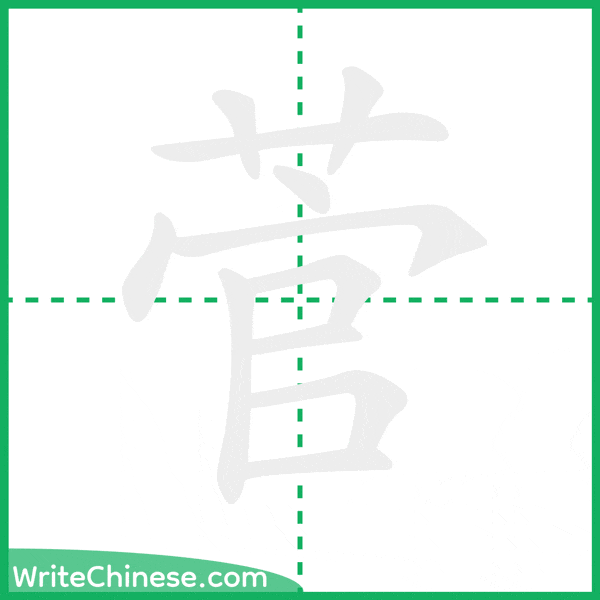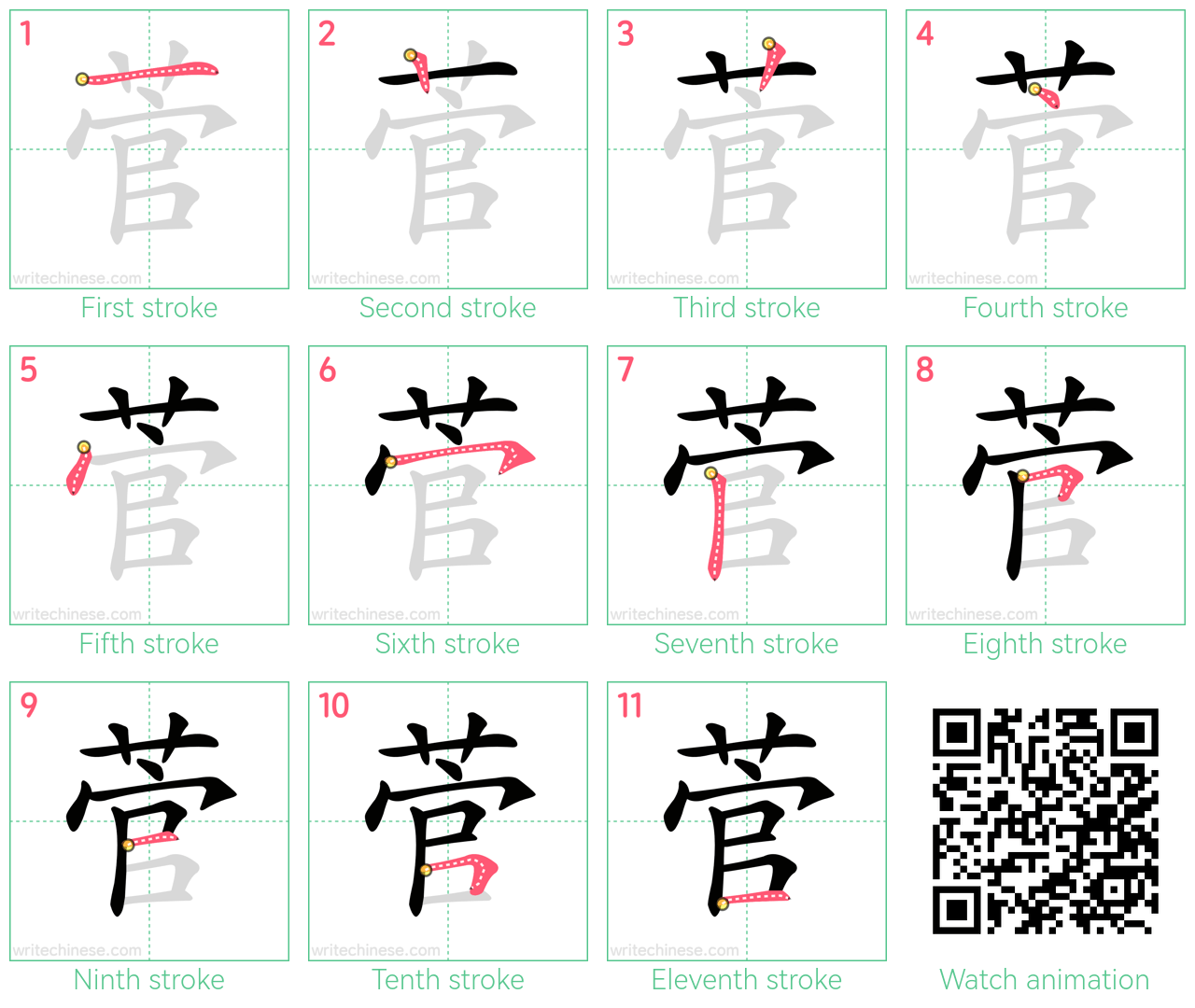How to write 菅
Animated Stroke Order of 菅
Learn to write the Chinese character "菅" by watching the stroke order animation of "菅".

Stroke by Stroke: 菅 Writing Order
Master the Chinese character '菅' stroke by stroke with visual step-by-step instructions.

Follow the Calligraphy Master: Writing '菅' Step-by-Step
Learn the proper way to write the Chinese character '菅' through a video tutorial with a calligraphy teacher. Follow the Calligraphy Master's Step-by-Step Guide to Write the Chinese Character '菅'. You can download the printable handwriting worksheets below and practice writing together with pen and paper.
Free Printable 菅 Handwriting Practice Worksheets
Meaning of 菅
Same Pronunciation Characters
Same Radical Characters
- 艺
- 艾
- 节
- 芋
- 芒
- 芙
- 芜
- 芝
- 芥
- 芦
- 芬
- 芭
- 芯
- 花
- 芳
- 芹
- 芽
- 苇
- 苍
- 苏
- 苑
- 苔
- 苗
- 苛
- 苞
- 苟
- 若
- 苦
- 英
- 苹
- 茁
- 范
- 茄
- 茅
- 茉
- 茎
- 茧
- 茫
- 茬
- 茵
- 茶
- 茸
- 荆
- 草
- 荐
- 荔
- 荡
- 荣
- 荤
- 荧
- 荫
- 药
- 荷
- 莉
- 莫
- 莱
- 莲
- 获
- 莹
- 莺
- 莽
- 菇
- 菊
- 菌
- 菜
- 菠
- 菩
- 菱
- 菲
- 萌
- 萍
- 萎
- 萝
- 萤
- 营
- 萧
- 萨
- 落
- 著
- 葛
- 葡
- 董
- 葫
- 葬
- 葱
- 葵
- 蒂
- 蒋
- 蒙
- 蒜
- 蒲
- 蒸
- 蓄
- 蓉
- 蓝
- 蓬
- 蔑
- 蔓
- 蔗
- 蔚
- 蔡
- 蔬
- 蔼
- 蔽
- 蕉
- 蕊
- 蕴
- 蕾
- 薄
- 薇
- 薛
- 薪
- 薯
- 藉
- 藏
- 藐
- 藕
- 藤
- 藻
- 蘑
- 艽
- 艿
- 芄
- 芊
- 芍
- 芎
- 芑
- 芗
- 芟
- 芡
- 芨
- 芩
- 芪
- 芫
- 芮
- 芷
- 芸
- 芾
- 苁
- 苄
- 苈
- 苋
- 苌
- 苎
- 苒
- 苓
- 苕
- 苘
- 苜
- 苡
- 苣
- 苤
- 苫
- 苯
- 苴
- 苷
- 苻
- 茀
- 茆
- 茌
- 茏
- 茑
- 茔
- 茕
- 茗
- 茚
- 茜
- 茨
- 茭
- 茯
- 茱
- 茴
- 茹
- 茼
- 荀
- 荃
- 荇
- 荏
- 荑
- 荚
- 荜
- 荞
- 荟
- 荠
- 荥
- 荦
- 荨
- 荩
- 荪
- 荬
- 荮
- 荸
- 荻
- 荼
- 荽
- 莅
- 莆
- 莎
- 莒
- 莓
- 莘
- 莛
- 莜
- 莞
- 莠
- 莨
- 莩
- 莪
- 莳
- 莴
- 莸
- 莼
- 菀
- 菁
- 菅
- 菏
- 菔
- 菖
- 菘
- 菟
- 菡
- 菪
- 菰
- 菹
- 菽
- 萁
- 萃
- 萋
- 萏
- 萑
- 萘
- 萜
- 萦
- 萱
- 萸
- 萼
- 葆
- 葑
- 葚
- 葩
- 葭
- 葳
- 葶
- 葸
- 葺
- 蒌
- 蒗
- 蒟
- 蒡
- 蒯
- 蒴
- 蒹
- 蒺
- 蒽
- 蒿
- 蓁
- 蓊
- 蓍
- 蓐
- 蓑
- 蓓
- 蓖
- 蓟
- 蓠
- 蓥
- 蓦
- 蓼
- 蓿
- 蔟
- 蔫
- 蔷
- 蔸
- 蔺
- 蔻
- 蕃
- 蕈
- 蕖
- 蕙
- 蕞
- 蕤
- 蕨
- 蕲
- 蕺
- 蕻
- 薅
- 薏
- 薜
- 薤
- 薨
- 薮
- 薰
- 薷
- 薹
- 藁
- 藓
- 藜
- 藩
- 藿
- 蘅
- 蘖


